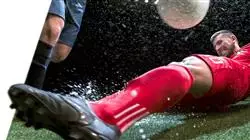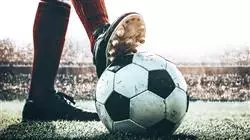University certificate
Scientific endorser

The world's largest faculty of sports science”
Description
Expand your skills and knowledge in high performance football with the advanced master’s degree in High Performance and Competition Football"

In a world in constant evolution, football is facing new challenges. Teams must face an increasingly demanding and competitive struggle, where high sports performance is essential. Technology and science have transformed sport, generating a need for professionalization in the different aspects that make it up.
In this context, specialization in High Performance Football is essential for those who wish to excel in this sport. For this reason, TECH has created the advanced master’s degree in High Performance and Competition Football, which is presented as a unique opportunity to acquire theoretical and practical knowledge that will improve the sporting performance of teams and players.
The program has a wide variety of topics covering exercise physiology and physical activity, biomechanics applied to high performance sports, planning applied to high performance sports, training methodology, physical preparation in football and football technique and tactics, among other areas.
Sports professionals who wish to specialize in high-performance football will be able to acquire specialized skills and knowledge in different areas, such as sports performance evaluation, statistics applied to performance and research, or psychology and nutrition applied to football.
The program offers a 100% online methodology, which allows students to access classes and study materials from anywhere in the world, without geographical or time constraints. In addition, students can adapt the pace of learning to their needs, ensuring a personalized and effective learning experience.
Develop your skills as a football professional with a program focused on the key areas of high performance sports”
This advanced master’s degree in High Performance and Competition Football contains the most complete and up-to-date scientific program on the market. The most important features include:
- The development of case studies presented by experts in high performance football
- The graphic, schematic, and practical contents with which they are created, provide scientific and practical information on the disciplines that are essential for professional practice
- Practical exercises where self-assessment can be used to improve learning
- Its special emphasis on innovative methodologies in high competition training
- Theoretical lessons, questions to the expert, debate forums on controversial topics, and individual reflection assignments
- Content that is accessible from any fixed or portable device with an Internet connection
Become a benchmark in the world of high performance football and lead highly effective teams and training plans with this Grand Master
Its teaching staff includes professionals belonging to the field of football, who contribute their work experience to this program, as well as renowned specialists from leading companies and prestigious universities.
The multimedia content, developed with the latest educational technology, will provide the professional with situated and contextual learning, i.e., a simulated environment that will provide an immersive learning experience designed to prepare for real-life situations.
This program is designed around Problem-Based Learning, whereby the student must try to solve the different professional practice situations that arise throughout the program. For this purpose, the professional will be assisted by an innovative interactive video system created by renowned and experienced experts.

Master the latest trends and technologies in training and sports performance with a complete and updated syllabus"
Objectives
The main objective of the advanced master’s degree in High Performance and Competition Football is to provide the student with advanced skills in the area of High Performance and Competition Football so that he/she can perform as a highly trained professional in the world of sports. The specific objectives of this program include acquiring in-depth knowledge of the physiology of exercise and physical activity, mastering biomechanics applied to high performance sports, learning how to structure or manage high performance football teams, among others.

The advanced master’s degree in High Performance and Competition Football will provide you with advanced skills in the area of High Performance and Competition Football"
General Objectives
- To know the origin, history and evolution of football
- Delve into the organization of a club and everything that surrounds the sporting environment
- Go deeper into current technical-tactical knowledge
- Investigate the change in football analysis with the introduction of new technologies
- Explain physical preparation and re-training as a fundamental part of today's football
- Highlight the importance of good nutrition for good sports performance
- Recognize each member of a coaching staff and their roles in a football club
- Delve into Psychology as a fundamental part of a football player's performance
- Master and apply with certainty the most current training methods to improve sports performance
- To effectively master statistics and thus be able to make a correct use of the data obtained from the athlete, as well as to initiate research processes
- Acquire knowledge based on the most current scientific evidence with full applicability in the practical field
- To master all the most advanced methods of sports performance evaluation
- Master the principles governing Exercise Physiology, as well as Biochemistry
- Master the principles governing Biomechanics applied directly to Sports Performance
- Master the principles governing Nutrition applied to sports performance
- Successfully integrate all the knowledge acquired in the different modules in real practice
Specific Objectives
Module 1. Exercise Physiology and Physical Activity
- Specialize and interpret key aspects of biochemistry and thermodynamics
- Gain in-depth knowledge of the energy metabolic pathways and their exercise-mediated modifications and their role in human performance
- Learn key aspects of the neuromuscular system, motor control and its role in physical training
- In-depth knowledge of muscle physiology, the process of muscle contraction and the molecular basis of this process
- Specialize in the functioning of the cardiovascular and respiratory systems and oxygen utilization during exercise
- Interpret the general causes of fatigue and impact in different types and modalities of exercise
- Interpret the different physiological milestones and their application in practice
Module 2. Biomechanics Applied to High Performance in Sports
- Specialize in the principles of Biomechanics oriented to physical education and Sport
- Apply the basic knowledge and technologies of biomechanics as a function of physical education, sport, performance and daily life
- Value the importance of protocols and the different types of biomechanical evaluation as a fundamental factor in the process of sports development and assessment
- Develop critical and analytical thinking that will allow him/her to generate innovative protocols and procedures, with different types of technology
Module 3. Planning Applied to High Performance in Sports
- Understand the internal logic of planning, such as its proposed core models
- Apply the Dose-Response concept in training
- Clearly differentiate the impact of programming with planning and its dependencies
- Acquire the ability to design different planning models according to the work reality
- Apply the concepts learned in an annual and/or multi-year planning design
Module 4. Structure and operation of a football team
- Know the organizational structure of a football club
- Differentiate between the different sporting bodies
- Distinguish functions between the different sporting and non-sporting areas
Module 5. Training methodology
- Master the different exercises for the maintenance of possession
- Describe the different recreational games in football
- Classify the various tasks within a training
- Design and plan training sessions
Module 6. Strength Training from Theory to Practice
- Correctly interpret all theoretical aspects defining strength and its components
- Master the most effective strength training methods
- Develop sufficient criteria to be able to support the choice of different training methods in their practical application
- Be able to objectify the strength needs of each athlete
- Master the theoretical and practical aspects that define power development
- Correctly apply strength training in the prevention and rehabilitation of injuries
Module 7. Speed Training from Theory to Practice
- Interpret the key aspects of speed and change of direction technique
- Compare and differentiate the speed of situational sport with respect to the track and field model
- Incorporate elements of observational judgment, a technique that allows discrimination of errors in the mechanics of the race and the procedures for their correction
- Become familiar with the bioenergetic aspects of single and repeated sprinting and how they relate to the training processes
- Differentiate the mechanical aspects that may influence performance impairment and the mechanisms of injury occurrence when sprinting
- Apply in an analytical way the different means and methods of training for the development of the different phases of speed
- Program speed training in situational sports
Module 8. Endurance Training from Theory to Practice
- Study the different adaptations generated by aerobic endurance
- Apply the physical demands of situational sports
- Carry out the different methods to organize training sessions
- Design training sessions taking into account the sport
Module 9. Mobility: from Theory to Performance
- Approach mobility as a basic physical capacity from a neurophysiological perspective
- Have a deep understanding of the neurophysiological principles that affect the development of mobility
- Apply stabilizing and mobilizing systems within the movement pattern
- Unpack and specify the basic concepts and objectives related to mobility training
- Develop the ability to design tasks and plans for the development of manifestations of mobility
- Apply the different methods of performance optimization through recovery methods
- Develop the ability to carry out a functional and neuromuscular assessment of the athlete
- Recognize and address the effects produced by an injury at the neuromuscular level in the athlete
Module 10. Technical staff and coaching
- Deepen knowledge of the evolution of the technical staff's working methods
- Explain the different roles played by the various members of a team's staff
- To deepen in the figure of the goalkeeper and his training
- Analyze the new technologies used for the maintenance of football fields
Module 11. Physical Preparation in Football
- Provide specific and specialized training to students through scientific and practical support on the different contents of Physical Preparation and Injury Readaptation
- Raise awareness of the different roles of professionals in the field and the possibility of multidisciplinary work with the aim of improving the player's performance
- Know both analytical and integrated training methods with the objective of maximizing performance and preventing the risk of injury in football players
- Know the methods of injury rehabilitation in order to design, plan and develop rehabilitation processes for the most common injuries in football
Module 12. Technique in football
- To include technique in a game model
- Differentiate between collective and individual technical aspects
- Knowing how to plan training sessions based on technique
- Detecting micro technical details in a professional football player
- Knowledge of what the technique is for
- Give greater importance to technique in grassroots and professional football
Module 13. Tactics in football
- Mastering the different tactical concepts
- To deepen the different concepts to achieve a better tactical vision
- Expand and improve tactical knowledge
- Obtain tactical skills and adapt them to the different situations that arise in the game
- Acquire a tactical reasoning that allows to face the different situations of the game, both their own and the opponent's
Module 14. Analysis in football
- Know and recognize the functions of an analyst within a technical body, as well as the types of analysts that currently exist
- Knowing how to analyze individually and collectively both one's own team and the rivals
- Learn how to give opponent's information to the players
- We will learn the different phases of analysis of a match: Pre, During, Post and Final Evaluation of the match
- Learn to work with the technological tools available right now
- Tagging and recognizing the different events that occur during a football game
Module 15. Football injuries
- Know the most common injuries in professional footballIdentify extrinsic and intrinsic factors affecting injuries
- To deepen the figure and functions of physicians, physiotherapists and sports readaptators
Module 16. Sports Performance Assessment
- Become familiar with different types of assessment and their applicability to the field of practice
- Select the most appropriate tests for your specific needs
- Correctly and safely administer the protocols of the different tests and the interpretation of the data collected
- Apply different types of technologies currently used in the field of exercise assessment, whether in the field of health and fitness performance at any level of demand
Module 17. Statistics Applied to Performance and Research
- Develop the ability to analyze data collected in the laboratory and in the field through various assessment tools
- Describe the different types of statistical analysis and their application in various situations for the understanding of phenomena that occur during training
- Develop strategies for data exploration to determine the best models to describe them
- Establish the generalities of predictive models through regression analysis that favor the incorporation of different units of analysis in the training field
- Generate the conditions for the correct interpretation of results in different types of research
Module 18. Psychology applied to Football
- To establish and define clearly and concisely what Sports Psychology is and its usefulness in the world of Football
- To make an approach to the most influential and moldable psychological variables in football
- Provide group management tools
Module 19. Nutrition applied to football
- Understand the energy needs and requirements of the athlete, as well as the importance of nutrition for sports performance
- Distinguish the types of macronutrients and micronutrients and know their relevance in football
- To know the nutritional strategies for different situations of the football player
- To develop the clinical reasoning required for the planning of nutrition programs adapted to the football player

Learn in depth about the physiology of exercise and physical activity, in order to plan and design training programs tailored to the needs of each player”
Advanced Master's Degree in High Performance Football and Competitive
TECH Technological University invites you to be part of its innovative Advanced Master's Degree in High Performance Football and Competition, a unique opportunity for those interested in excelling in the field of professional soccer. This virtual program offers a complete and up-to-date training, based on technology and the experience of experts in the field of soccer, with the objective of preparing professionals to face the challenges and demands of the highest competitive level.
The program covers a wide range of topics, including game tactics and strategy, player performance analysis and management, physical and mental preparation, sports nutrition, team management and training planning. Participants will also have the opportunity to apply the knowledge acquired in practical cases and real-life case studies, allowing them to develop practical and strategic skills to excel in the competitive world of professional soccer. With this postgraduate course, soccer professionals will be prepared to lead teams, make sound decisions in high-pressure situations and achieve success in high-level competition.







